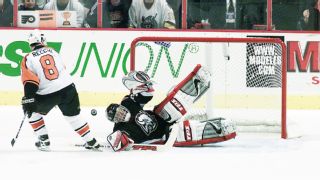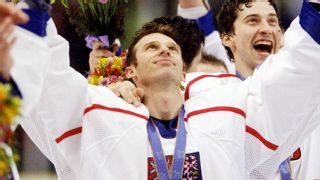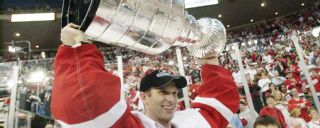|
It was Dec. 5, 2001, a game that was ripe with anticipation. An already heated rivalry, intensified by the prospect of the two best goaltenders in the game, going head to head. Patrick Roy and the Colorado Avalanche against Dominik Hasek and the Detroit Red Wings. Red Wings general manager Ken Holland remembered that morning's newspaper -- a split shot of the elite netminders, pitting the two against each other within the margins of the broadsheet before they were set to square off on the ice. Hasek did not fare well that night and the Red Wings lost 4-1. He gave up four goals on 18 shots. It was not what he had hoped to deliver against Roy, his nemesis. Holland was walking into the rink the next day when a parking-lot attendant at Joe Louis Arena waved him down. Hasek's car had been in the team lot all night, the attendant told Holland. Not knowing what to think, Holland investigated further and, 13 years later, still chuckles about what he found. A bedraggled Hasek had spurned the comfort of his own bed and spent the night instead in the team's stick room -- more of a glorified closet at the time, one player noted -- refusing to leave the rink after his lackluster performance. "Punishing himself," Holland told ESPN.com. Holland loves to tell that story because it offers a glimpse into just how fierce a competitor Hasek was, how much he cared. With the 49-year-old set to enter the Hockey Hall of Fame next week as part of the class of 2014 that includes Mike Modano, Rob Blake and Peter Forsberg, Hasek's induction has prompted many of his former teammates, coaches, friends and foes to recall their quintessential "Dom" moments. Known for his unique, unorthodox and often acrobatic style, Hasek made saves no one else could even fathom making, saves no one else even dared to attempt. Even saves other goaltenders found difficult, Hasek made appear routine. Former NHL netminder Martin Biron remembers sitting up in the press box at Madison Square Garden on March 19, 1999, having been recently recalled to the Buffalo Sabres -- for whom Hasek was playing at the time -- from the AHL's Rochester Americans. He watched as Hasek expertly leaped to his right and executed a roll, thrusting both legs in the air to rob New York Rangers forward Manny Malhotra in the Sabres' 3-2 overtime win. "All of MSG went silent in disbelief of what they had just seen," Biron told ESPN.com. Biron also recalled seeing the legendary glove save Hasek made against Pittsburgh Penguins star Mario Lemieux on a breakaway in Game 4 of the Stanley Cup finals in 1992, when Hasek was playing for the Chicago Blackhawks. The save was so staggering, Biron recalled, that the official asked Hasek to open his glove to verify it had actually gone in. So many of Hasek's highlight-reel saves elicit that sort of response. Marian Gaborik still shakes his head recalling the famed sequence between him and Hasek in 2007 during which Hasek raced out -- nearly past the circles -- to take out an unsuspecting Gaborik on a breakaway. Gaborik flipped over the top of Hasek and took a nasty spill onto the ice. "The puck was rolling, I looked up and he was right there," Gaborik told ESPN.com "There was nowhere to go." To this day, what strikes Gaborik most is how incredulous Hasek was about the tripping penalty he incurred. Former NHL scoring phenom Theo Fleury still rues Hasek's prowess. "He was the one guy I could never score on," Fleury said in a conversation with ESPN.com back in September. Even in practice, he was virtually impenetrable. According to former Sabres coach Lindy Ruff, who now coaches the Dallas Stars, Hasek would sometimes go an entire practice giving up one, maybe two goals. Hasek was so dominant, Ruff sometimes wondered about the adverse effects on his teammates' psyche. "I often thought it was too frustrating for guys because they never scored on him in practice," Ruff told ESPN.com. Former Red Wings teammate Kris Draper remembered the morning after a triple-overtime Game 3 victory over the Carolina Hurricanes in the 2002 Stanley Cup finals in which Hasek faced 43 shots and was on the ice for 114 minutes, 22 seconds. Draper was sure everyone would exercise the option of taking the next day off the ice. Not Hasek, though. He wanted to get back out there and take some shots. "I can't say enough how competitive he was, and really how he made us better," Draper told ESPN.com. Having seen many of his former Wings teammates enter the Hall, Draper has learned to identify what separates them from most, even above other elite players. "Obviously, they had some God-given talent, but the thing that made them the greatest is how competitive they were," he said. "To have the talent and the drive, that's the reason these guy go into the Hall of Fame." Individually, Hasek is one of the most decorated goaltenders of all time, making him a no-brainer as a first-ballot selection. During his nine-season run in Buffalo, he won six Vezina Trophies as the league's best goalie and was named the Hart Trophy winner as MVP in back-to-back seasons (1997,1998), setting an an abundance of franchise records along the way.  Hasek, who began his career with the Blackhawks but spent the bulk of it in Buffalo, won two Stanley Cup championships with the Wings (2002, 2008) and led his countrymen from the Czech Republic to the country's first and only Olympic gold medal in Nagano, Japan, in 1998. Hasek, who began his career with the Blackhawks but spent the bulk of it in Buffalo, won two Stanley Cup championships with the Wings (2002, 2008) and led his countrymen from the Czech Republic to the country's first and only Olympic gold medal in Nagano, Japan, in 1998.
The latter was a special accomplishment, especially considering it was the first time NHL players were allowed to compete in the Olympics. Hasek was the undisputed star of the tournament, stifling opponents and giving his team the confidence to pull off upsets against the heavily favored Canadian and U.S. teams. "We felt like we could beat anyone," said Hasek's teammate Petr Svoboda, who scored the lone goal for the Czech team in the gold-medal game against Russia. Hasek had that way about him, infusing his teammates with the belief that anything was possible. "You can always make the argument for Patrick Roy and Marty Brodeur, but I really think that Hasek, in the modern era, is the best that ever played," said Hasek's longtime goaltending coach in Buffalo, Mitch Korn. "Part of that was he took teams that weren't great teams and made them pretty great teams, and he did it every day, every year, for quite a while." Korn, who is now a goaltending coach for the Washington Capitals, said Hasek's focus and anticipation was unrivaled. He remembered one practice in particular when Donald Audette fired a puck in Hasek's direction, trying to catch Hasek unprepared while he was locked in on a developing 3-on-2 rush during practice. Not only did Hasek snag that errant puck out of midair, he recovered in time to stop the shot on the ensuing odd-man rush, too. "He was unbelievable at processing the game first," Korn told ESPN.com. "You can talk all about how he could get his body into unique positions, but at the end of the day, he saw the game in slow motion. He could read pucks, connect the dots, see pucks off the stick. He was competitive as anyone I've ever coached." That competitive fire -- Ruff will tell you Hasek was in his office not many years ago, swearing he could still play and help the team -- could make a coach's life easier, too. "He was the best player-development guy we had. You didn't have to beat up guys for mistakes because Dom cleaned up mistakes," Ruff said. "Now, young defensemen get scored on too many times, they come out of the lineup. When we had Dom, he didn't make many mistakes and cleaned up an awful lot as a goaltender. People joked about it, but it was true." Ruff said the Sabres won a lot of one-goal games, and it was not precarious territory with Hasek between the pipes. There was a comfort factor in knowing that a one-goal lead was pretty safe. Hasek could take over from there.  "Patrick Roy may be the best playoff goalie, Brodeur may be the best regular-season goalie, but pick a guy to dominate a game and that was Dom," Biron said. "Patrick Roy may be the best playoff goalie, Brodeur may be the best regular-season goalie, but pick a guy to dominate a game and that was Dom," Biron said.
Hasek sometimes made headlines off the ice, too. There was his contentious relationship with Sabres coach Ted Nolan -- a power struggle that ultimately ended with Nolan's first departure from Buffalo -- and an incident in which he attacked a reporter from a local newspaper in 1997. Those are the murkier corners of Hasek's legacy, a time of erratic behavior and head-scratching antics. As most goaltenders do, Hasek had his quirks. He was a guy who claimed he spoke not a word of English when he first arrived in the NHL but blossomed into the type of player known for his eclectic brand of humor. He'd proudly parade his lanky frame around in a tiny towel in the locker room, one teammate recalled, or methodically clip his fingernails when others might be trading stories or playing jokes. Sometimes, he'd bring along an electronic chess kit during road trips and play against the game. "If Dom was North American, we'd call him 'eccentric,'" Korn said. "He was unique, and he was very, very smart." Both his smarts and tenacious desire to be the best helped Hasek enjoy a long and fruitful career, long past the playing age of most netminders. "With superstars -- and he was a superstar -- they can play longer than anyone else because even when their skills diminish, they're still good players," Holland said. And Hasek's acumen, his knack for thinking and reading the game, was never diminished. "He was like a chess master," Holland said. Ask Hasek what he is most proud of throughout his 16-season career, and he knows the Cup and the gold medal are what most expect him to say. But he cherishes that longevity. He's happy he was able to maintain such a high level of play for such a long time. "I am very proud that I could stay in hockey for such a long time," Hasek told ESPN.com from his home in Prague, recalling a career that began in the Czech elite league at the age of 16 and ended after a final tour in the Kontinental Hockey League in 2010-11, at age 46. "I was very lucky that I could stay in hockey, pro hockey, for 30 years." What does he think allowed him to thrive for so long? "It's hard to say," Hasek said, wracking his brain while intermittently barking commands to his dog, an English Setter whom he spends time hunting with in his native Czech Republic. Hasek mentioned great teammates, great teams, his preternatural sense of flexibility and luck, but then settled on one thing no one can dispute. "You can be talented and have great people around you," he said, "but the love for the game was No. 1."
|


